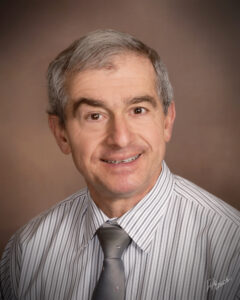With a membership of 50 rheumatology professionals, including doctors, physician assistants and nurse practitioners, the Wisconsin Rheumatology Association (WRA) is commemorating its 16th anniversary this year. The organization existed as a loosely organized annual gathering of a handful of rheumatologists until 2005, when a more formal charter was executed.

Dr. Daniel Malone
Daniel G. Malone, MD, RMSK, FACR, clinical associate professor of medicine-rheumatology at the Medical College of Wisconsin in Milwaukee, rheumatologist in the Prairie Ridge Clinic of the Columbus Community Hospital, has been president of the WRA for the past seven years. Kurt Oelke, MD, and Alvin Wells, MD, PhD, are WRA’s other executive officers.
According to Dr. Malone, the WRA works with WJ Weiser & Associates, an Illinois-based association management company, to coordinate meetings and secure speakers and sponsors.
Addressing the Rheumatologist Shortage
Like many states, Wisconsin struggles with having enough rheumatologists to treat patients. The state has about 80 rheumatologists in active practice, and the Department of Health Services reports 1.1 million adults in the state are living with arthritis.
“A lot of specialists are retiring, so it’s an ongoing challenge to ensure all patients get the services they need,” Dr. Malone says.
Most rheumatologists in Wisconsin practice in urban areas, leading to a shortage of specialists in rural regions, Dr. Malone says. According to the University of Wisconsin, Madison, 28% of the state’s residents live in rural areas, but only 11% of physicians have rural practices.¹
The Medical College of Wisconsin rheumatology fellowship program is one entity working to help increase the number of rheumatologists in the state. The University of Wisconsin School of Medicine & Public Health and the state’s health systems are also working to develop residency programs in rural areas. “There are currently seven fellows in adult rheumatology and seven in pediatrics in Wisconsin,” Dr. Malone says. All medical students, residents and fellows are invited to WRA meetings with complimentary registration.
The Wisconsin Office of Rural Health also offers doctors and dentists money to help pay off student debt in return for three years of work in areas of the state facing shortages.
During the pandemic, many physicians, including rheumatologists, began using telemedicine to offer virtual visits as an alternative to in-person visits. The technology is also being considered as a way to conduct rheumatology follow-up visits for older patients and those who live in remote, rural areas.
One example of this is the telerheumatology program at William S. Middleton Memorial Veterans Hospital, Madison, where rheumatology patients have an initial in-person evaluation but can choose virtual follow-up appointments.
“Today, patients expect to be seen in a timely fashion. The days of waiting four to six months to see a rheumatologist are over,” says Dr. Wells, director of the Rheumatology and Immunology Center in Franklin, adjunct assistant professor at Duke University and vice president of the WRA.
In a speech at the 2020 Rheumatology Winter Clinical Symposium held in Maui, Hawaii, Dr. Wells said, “If you aren’t thinking of telerheumatology, you will not be able to compete with growing patient demands, expectations and clinical monitoring.”²
He noted that nurse practitioners and physician assistants are also being trained to play a larger role in delivering rheumatology care.
Advocacy Efforts
Dr. Malone says the WRA began holding advocacy sessions at its annual meetings about five years ago. At the 2020 meeting, in the presence of five Wisconsin state legislators, two patients with rheumatic disease presented stories about how they were unable to receive the medication their doctor prescribed, were denied a service their provider thought was necessary, or were forced to change medications during successful treatment.
“We all hear stories like this from our rheumatology patients, but this session and those in other years give us the chance to educate our legislators about some of the common obstacles we face in providing patients with the best possible treatment,” Dr. Malone says. WRA also keeps its members aware of recently passed and pending legislation.
The WRA offers continuing medical education (CME) credits at its annual meetings, as well as CME-accredited dinners throughout the year, featuring top experts in various topics relevant to clinical rheumatology and basic science.
“At one of these weeknight, catered dinner meetings, we had a speaker discuss the new genetic engineering technique CRISPR and had over 20 rheumatologists in attendance,” Dr. Malone says. “Most physicians are pressed for time, so offering CME opportunities they can work into their schedules while networking with others in their field makes sense and is consistent with our stated mission of providing excellent educational experiences for all of our members as often as possible.”
WRA’s next annual meeting is scheduled for March 19–20, 2021, at The American Club Resort in Kohler. The 2022 meeting will be held March 18–19 at the same location.
Linda Childers is a health writer located in the San Francisco Bay Area.
References
- Rural Health Equity, Interprofessional Continuing Education Partnership, University of Wisconsin–Madison, Nov. 19, 2019. Accessed Feb. 24, 2021.
- Troum O, Wells AF. Point-counterpoint: Telemedicine is the future of rheumatology. Presented at Rheumatology Winter Clinical Symposium; Feb. 12–15, 2020; Maui, Hawaii.


